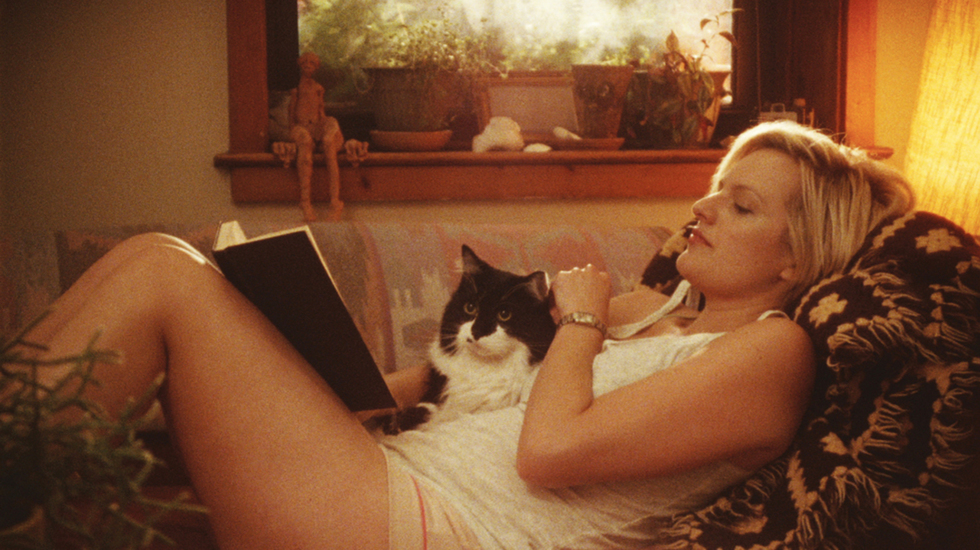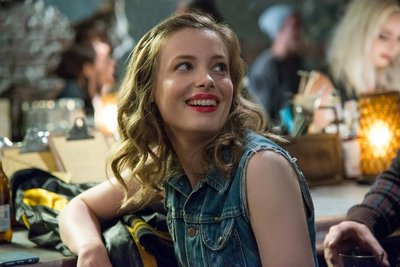
BY KAREN KEMMERLE |
Elisabeth Moss On ‘Listen Up Philip’ And What Makes An Auteur
We talk to the 'Mad Men' star about working with Alex Ross Perry, the freedom of indie film, and spending the summer in NYC after a breakup.

Elisabeth Moss is that special kind of actress who can float seamlessly between film and television. This year, she starred in two independent features, Charlie McDowell’s The One I Love (which had its NY premiere at TFF 2014) and Alex Ross Perry’s stunning Listen Up Philip. In Listen Up Philip, the talented Moss plays Ashley Kane, a photographer successful in all areas of her life…except for her relationship with Philip (Jason Schwartzman), a self-obsessed and self-important novelist.
We talked to the actress about the accessibility of digital distribution, rehearsing, and what exactly makes Jason Schwartzman so enjoyable off-screen.
Tribeca: You had two movies at Sundance this year, Listen Up Philip and The One I Love. Did you get to fully immerse yourself in that experience?
Elisabeth Moss: I was pretty much on the go, unfortunately. It was great, though, because both Listen Up Philip and The One I Love had small casts and crews, so I got to see all my friends again, however briefly. I wish I could have spent a week promoting each film. I was shooting Mad Men at the same time, so I had to cram in as much as I could in just three or four days. It was almost funny going back and forth between films because I would see someone from one film while I was promoting the other, and it felt like I was cheating on them with the other movie [laughs].
I liked the idea of telling the story of a girl going through a breakup. It was real, honest, and true to life.
Tribeca: Well, I loved both films. Were you familiar with Alex Ross Perry’s movies before working with him on Listen Up Philip?
EM: After I read the script for Listen Up Philip, I immediately watched The Color Wheel to have something else to talk about with him at our meeting. I was obviously really impressed. The Color Wheel is such a strange and cool movie, although the ending repelled me. That was interesting.
Tribeca: What’s the first thing that struck you about the script for Listen Up Philip?
EM: I think I was in love with the script from the very first scene. Alex kicked the movie off by having this incredibly misanthropic character give a piece of his mind to this woman, and all I could think was, “God haven’t we all wanted to say this to somebody who didn’t help us or who wasn’t on our side?” There are a few people I’ve wanted to sit down across from and tell them, “you did nothing for me.” I thought that was a super cool and unusual way to start a movie, and I loved it from the first scene.
Tribeca: The movie focuses on Philip and his relationships and oddities; however, I thought your character, Ashley, really was the emotional core of the film. What drew you to the role?
EM: I liked the idea of telling the story of a girl going through a breakup. It was real, honest, and true to life. I moved to New York when I was nineteen and spent my twenties here in the city. That idea of breaking up with somebody and spending the summer in the city was so relatable to me. I’ve done that, and I’ve seen my girlfriends do it too. I’ve experienced this exact arc in my own life.
Tribeca: I love the bit of narration that essentially says “Ashley had made the decision that Philip was no longer welcome, having come to the realization that she would no longer invest in somebody who would routinely cause her to feel terrible.” It’s such a great moment. Can you talk about Ashley’s journey over the course of the film?
EM: That’s exactly what I loved about it. Haven’t we all been in a relationship and love the other person, but know we shouldn’t be with them and that they don’t make us feel good? It takes a lot of strength to extricate yourself from that relationship. I was very attracted to telling that story because I feel like both men and women can relate.
Tribeca: The majority of your scenes in Listen Up Philip are with Jason Schwartzman. Can you talk about working with him?
EM: I adore him. He is just one of the loveliest people you will ever meet—so funny and smart. He constantly makes people around him laugh. It’s just a joy to be around him. I first met him when I was sixteen in LA, and I’ve see him sporadically through the years. When I knew Jason was doing this film, I thought it made sense for the two of us to be in a movie together [laughs]. There’s something similar about our sensibilities.

Tribeca: Did you get to have any rehearsal before shooting started?
EM: Jason and Alex had a couple of weeks together, and then I came in on the last week. We basically just sat around in Jason’s apartment and talked for hours. I remember going through the script scene by scene, but we never read anything out loud. None of us were interested in doing that. We shared stories from our lives and past relationships, and then we’d go get juice or coffee [laughs]. It was really great.
Tribeca: If you had to describe Alex Ross Perry in one word, what would it be and why?
EM: I don’t know if I could do it in one word! I think he’s very like directors in the 60s and 70s who were making films that were unique and completely their own. It didn’t matter whether or not anyone liked them. There are filmmakers like that today—Coen Brothers, Wes Anderson, PTA, Baz Luhrmann—and audiences can immediately identify their movies. Alex is in that group. He has such a specific viewpoint and style. His movies are unmistakably his.
Tribeca: I think it’s fitting that Listen Up Philip is playing at NYFF, a Festival that really celebrates auteurs.
EM: I’m glad you said that. Auteur. That’s exactly the word I wanted to use, but didn’t want to sound presumptuous because Alex is a relatively new filmmaker [laughs]. I think he’s on his way to becoming one. I feel lucky to get in on the ground floor.
Tribeca: Was there any scene that was particularly challenging for you to shoot, and will you talk about it?
EM: The scene between Jason and me towards the end of the film. It was challenging because the script provides a description of us being on either side of the door with only narration, no dialogue. It took a couple hours to light it so Jason and I sat on the stoop, and we wrote a scene that we could do while that narration was going on. We timed it so the dialogue was exactly the length of the narration. We didn’t want to improv and flounder around. We wanted it to be a real scene. So if you didn’t use the narration, you could use the scene. It was a real challenge.
While it’s nice to have a big budget…the more you get into that world, the less control you actually have over the creative process.
Tribeca: That kind of creativity and freedom seems like something that can happen only in an indie movie. What’s your favorite thing about working on independent films?
EM: I do enjoy the freedom. You can come up with a moment or an extra line of dialogue and shoot it on the fly. You don’t have to run it by the producer, who then has to run it by the studio and so on and so on. The location manager doesn’t have to go get another permit, you know? It’s like the song says, “mo’ money, mo’ problems!” While it’s nice to have a big budget…the more you get into that world, the less control you actually have over the creative process.
Tribeca: Have you fully embraced the age of digital distribution?
EM: My knowledge of VOD and all that is fairly recent. Everything I know about it comes from working on The One I Love and Listen Up Philip, which both had different digital release strategies. I am not one to speak on what’s the right way to do it. I know there are many people with very strong opinions on the matter. All I know is that I’m a person who likes going to the theater, but I’m also someone who travels a lot and tends to watch movies on airplanes and in hotel rooms. I think there’s real value to both theatrical and digital distribution. I think accessibility in this age is something you can’t get away from.
Tribeca: Throughout your career, you’ve switched between film, TV and theater roles. Do you find yourself changing your creative process depending on the medium?
EM: Each medium is so different. On TV, you don’t have a lot of time. You get the script, and you shoot the episode a day later. However, you also have a character that you lived with for years, so that’s really helpful. On a film, you get anywhere from a couple of weeks to a couple of months before you start work. Theater is its own animal completely. You get to immerse yourself for a month or two into this play that is your sole focus. A play is a complete piece—you’re working on it from beginning to end each night.
I think I adapt the way I work based on the medium, but at the same time, I tend to be a very instinctive actor. I don’t like to rehearse. I don’t like to do the same thing twice. So regardless of whether I am working in film, television or theater, I go by instinct. If I’m in theater, I try to change it up all the time. In film and TV, I don’t like to do the same take twice.
Listen Up Philip is now playing in select theaters and hits VOD/digital platforms on October 21.

